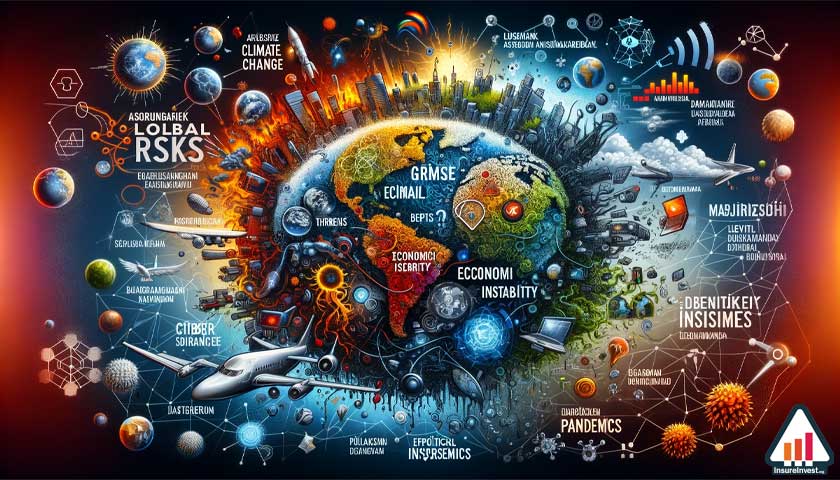Navigating the Global Economic Landscape
In an era of unprecedented change and complexity, navigating the global economic landscape has become both a formidable challenge and a unique opportunity for businesses and individuals alike. As we face a mix of geopolitical tensions, technological disruptions, and emerging markets reshaping the economic terrain, the journey often feels as critical as the destination. Armed with a deep dive into the current climate, a keen understanding of international trade intricacies, and adaptive strategies for innovation, entities can not only weather volatility but can also emerge more robust and agile. This blog post is dedicated to unwrapping the challenges, trends, and the road ahead, providing actionable insights for those eager to master the global economic scenario and carve out a prosperous path in a world brimming with both hazards and prospects.
Understanding the Current Global Economic Climate
In a rapidly shifting world, understanding the current global economic climate is crucial for anyone looking to thrive. Navigating the Global Economic Landscape involves grappling with complex challenges and trends, with proven strategies essential for steering a successful course.
The current climate is characterized by several key factors:
- Fluctuating Markets: Volatility in the stock market and currency values can affect both investment strategies and international trade relations.
- Geopolitical Tensions: Trade wars and sanctions can lead to uncertainty, impacting global supply chains and economic growth.
- Technological Disruption: Innovative technologies are reshaping industries, creating new markets and extinguishing outdated business models.
- Environmental Concerns: Climate change and sustainability issues are increasingly influencing economic policies and consumer behavior.
Understanding these elements is the first step on the road ahead. It is not just about recognizing the challenges but also about identifying the underlying trends that offer new opportunities. As the global economic landscape evolves, agility and informed decision-making are the keys to overcoming obstacles and capitalizing on the emerging prospects. Navigating the Global Economic Landscape is about being proactive, staying informed, and adapting to change to ensure long-term success in a complex international marketplace.
Navigating the Complexities of International Trade and Commerce
In the ever-evolving realm of international trade and commerce, businesses must remain adept at “Navigating the Global Economic Landscape: Challenges, Trends, and the Road Ahead” to ensure ongoing success. Here are essential considerations for thriving amidst these complexities:
- Regulatory Compliance: Stay updated on diverse trade laws and regulations. This knowledge is crucial to avoid costly legal penalties and maintain a smooth supply chain.
- Market Dynamics: Understanding demand fluctuations and competitive forces across different regions is vital for making informed business decisions.
- Currency Variation: Effectively manage the risks associated with foreign exchange rates to protect your profit margins.
- Cultural Insights: Building relationships and marketing effectively hinge on cultural awareness. Tailoring your approach to each locale can significantly impact success.
- Logistical Strategies: A robust logistics plan that adapts to changing environments will keep your operations resilient against disruptions.
Moreover, companies must also reflect on the social and ethical implications of their strategies, ensuring they contribute positively to the “Navigating the Global Economic Landscape: Challenges, Trends, and the Road Ahead”.
In conclusion, the key to mastering international trade lies in developing a proactive, informed, and adaptive approach that considers all facets of the global economic tapestry. As the landscape continues to shift, agility and foresight will be indispensable allies in charting a course toward prosperity.
Adapting to Technological Advancements in the Global Market
Navigating the global economic landscape requires a keen understanding of how technological advancements are transforming markets. Companies and investors alike must adapt swiftly to stay competitive within the dynamic global economy. Here’s how you can navigate these changes:
- Embrace Innovation: Adopt cutting-edge technologies that can streamline operations and enhance customer engagement. Whether it’s artificial intelligence, blockchain, or Internet of Things (IoT), being at the forefront of innovation can give you an edge.
- Invest in Digital Skills: As technology evolves, so does the demand for digital literacy. Ensure your team is well-equipped with the necessary skills to harness new tools effectively.
- Stay Agile: The ability to pivot and adapt strategies is more crucial than ever. Being agile in response to technological shifts can prevent disruptions and capitalize on new opportunities.
As we continue Navigating the Global Economic Landscape: Challenges, Trends, and the Road Ahead, staying attuned to tech trends is not just beneficial but essential. The road ahead will likely be paved with unprecedented technological milestones, and adapting to these is key to sustained success in the global market. Keep an eye on industry disruptors and be ready to integrate advancements promptly and proficiently.
Strategies for Overcoming Economic Uncertainty and Volatility
In the quest for mastering the global economic landscape, businesses and investors are often faced with the daunting task of overcoming economic uncertainty and volatility. Navigating the global economic landscape: challenges, trends, and the road ahead require well-thought-out strategies that can steer endeavors towards stability and success.
Diversification: One of the most effective ways to mitigate risk is through diversification of assets and revenue streams. This can be achieved by spreading investments across different geographical regions and industries.
Market Research: Keeping abreast of economic indicators and market trends allows for anticipatory adjustments in strategy. In-depth research into consumer behavior and forecasting helps in maneuvering through unforeseen challenges.
Risk Assessment: Regular risk assessment and management are vital. Identifying potential risks and establishing contingency plans ensure preparedness for economic shifts.
Flexible Planning: Adopting agile methodologies in planning allows for swift adaptation to changing economic conditions. Flexibility in operational and financial planning empowers businesses to pivot as needed.
Incorporating these strategies can effectively navigate the global economic landscape. While challenges and trends constantly reshape the road ahead, a proactive and strategic approach equips businesses with the tools necessary for navigating through uncertainty and embracing the potential of emerging opportunities.
Identifying and Capitalizing on Emerging Markets and Sectors
In the pursuit of mastering Navigating the Global Economic Landscape: Challenges, Trends, and the Road Ahead, astute investors and business leaders give special attention to emerging markets and sectors. These arenas hold the promise of lucrative returns and the potential to spearhead economic growth. Here are key strategies to identify and capitalize on these opportunities:
- Market Research: Thorough analysis of demographic trends and consumer behaviors can unveil patterns that signal the rise of new markets.
- Technological Adoption: Staying abreast of how technology can disrupt industries is crucial in spotting pioneering sectors early on.
- Risk Assessment: Conducting a comprehensive risk versus reward evaluation helps balance the potential gains with the inherent uncertainties of emerging markets.
- Local Partnerships: Building relationships with local entities can provide invaluable insights and facilitate smoother entry into these markets.
By prioritizing these strategies, businesses and investors can navigate Navigating the Global Economic Landscape: Challenges, Trends, and the Road Ahead with a visionary approach. This foresight not only helps in overcoming the typical barriers to entry but also positions entities at the forefront of innovation and growth, turning challenges into success stories in the dynamic global economic tapestry.
Investing in Sustainable Development for Long-Term Growth
In today’s ever-shifting economy, investing in sustainable development is a strategic imperative for fostering long-term growth. Navigating the global economic landscape requires a deep understanding of how sustainable practices can drive profitability while also addressing environmental and social challenges. Here are key considerations to keep in mind:
- Longevity and Efficiency: Sustainable investments often lead to improved efficiency and longevity in operations, reducing costs in the long run.
- Regulatory Compliance: As regulations tighten, sustainable investments can prevent future legal and compliance costs.
- Consumer Demand: A growing trend in ethical consumerism means that sustainable practices are often rewarded by the market.
Sustainable development is not just about conducting business responsibly; it’s about harnessing opportunities that align with the evolving demands of our global economy. Whether it’s investing in green technology or adopting eco-friendly supply chain methods, companies are finding that these strategies don’t just make good ethical sense; they make good business sense, too.
By prioritizing sustainability, businesses can navigate the global economic landscape more effectively, adapt to emerging trends, and be well-positioned to face the road ahead. Moreover, these investments contribute to a more stable and resilient economic environment, offering a shield against the unforeseen disruptions that increasingly characterize our global economic system.
Building Resilience against Global Economic Shocks
In today’s interconnected world, building resilience against global economic shocks is essential. Companies, individuals, and countries must adopt strategies to cushion themselves from unforeseen economic disturbances. Here are actionable steps to enhance economic resilience:
Diversification: Spread assets and investments across various sectors and geographies to mitigate risks. This approach reduces reliance on any single market, safeguarding against regional downturns.
Flexibility: Implement adaptable business models and agile practices, enabling quick responses to changing economic scenarios. Flexibility in operations can be a game-changer in rebounding from economic shocks.
Strategic Partnerships: Forge alliances with other entities to create support networks that can help absorb shocks. Collaborative ventures can share risks and offer mutual aid during crises.
Robust Financial Planning: Prioritize robust financial planning with ample emergency funds and backup liquidity sources, ensuring operational endurance during economic hardships.
Navigating the global economic landscape, particularly focusing on challenges, trends, and the road ahead, calls for a proactive stance. By anticipating potential economic shifts and preparing accordingly, one can build a fortress of resilience. This fortification not only shields against immediate impacts but also paves the way for sustained prosperity in the ever-evolving global economy.
Frequently Asked Questions
What are the current challenges in the global economic landscape?
The current challenges in the global economic landscape are multidimensional and include factors such as geopolitical tensions, trade disputes, and economic protectionism which can lead to market volatility and uncertainty. Additionally, the aftermath of the COVID-19 pandemic has presented further difficulties including supply chain disruptions, workforce shortages, and inflationary pressures. Environmental concerns and the ongoing energy transition add another layer of complexity to the economic scenario, requiring businesses and policymakers to adapt to the reality of climate change and the urgency of sustainable practices.
How can businesses overcome economic challenges and remain competitive?
To overcome economic challenges and remain competitive, businesses need to adopt a proactive and flexible approach. This involves implementing resilient supply chain strategies, diversifying sourcing options, and investing in technology to increase efficiency and reduce vulnerabilities. Building strong relationships with stakeholders, including suppliers and customers, helps to create a supportive network that can weather potential disruptions. Additionally, businesses should be constantly vigilant on the regulatory landscape and agile enough to respond quickly to changes in tariffs, trade policies, and other regulations. Innovation and adaptability are crucial in developing products and services that meet changing consumer demands and stand out in a crowded marketplace.
What emerging opportunities are available in the global economy?
The global economy offers numerous emerging opportunities for businesses positioned to take advantage. One significant area is the digital economy, propelled by advancements in artificial intelligence, machine learning, blockchain, and the Internet of Things (IoT). These technologies enable new business models and services in industries such as finance, healthcare, and retail. Furthermore, the shift toward sustainable and green practices opens opportunities in renewable energy, eco-friendly product development, and sustainability services. Emerging markets also present potential for expansion with their growing middle classes and increasing consumption. Embracing these opportunities often requires innovation, investment in R&D, and strategic partnerships.
What strategies should policymakers employ to support economic growth?
Policymakers should focus on creating a stable and supportive environment for economic growth. This includes pursuing sound fiscal and monetary policies, investing in infrastructure, and ensuring access to education and training programs to build a skilled workforce. Additionally, fostering an entrepreneurial ecosystem can encourage innovation and the development of new industries. Trade policies should aim to promote open markets while balancing the need for fair competition. Regulators should consider implementing measures to protect consumers and the environment without stifiling innovation. International cooperation is also key to tackling global challenges like climate change and pandemic response, which have far-reaching implications for economic stability and growth.




Greetings from the UAE! The analysis of geopolitical tensions and the role of international cooperation is spot on. In a region often influenced by global shifts, understanding these dynamics is crucial. Great insights into the ever-changing world economy!
Excelente artigo! A seção sobre a recuperação pós-pandêmica e as tendências emergentes no Brasil são especialmente relevantes. A desigualdade social é uma preocupação global, e este artigo oferece insights valiosos. Saudações do Brasil!
作为一个中国的投资者,数字货币和全球贸易的部分引起了我的关注。世界经济的不确定性使得国际合作变得尤为重要。感谢这篇文章,为我们提供了一个更全面的视角。来自中国的问候!
Un articolo molto ben strutturato! La sezione sulle sfide e rischi, in particolare sull’ineguaglianza sociale e la sostenibilità ambientale, riflette le preoccupazioni attuali. Speriamo che l’economia globale possa adottare politiche inclusive per affrontare queste sfide. Saluti dall’Italia!
Fascinating read! As an American investor, the section on technology’s influence and the rise of ESG investing particularly resonated with me. The world economy is indeed evolving, and staying informed is crucial for making wise financial decisions. Kudos from the USA!